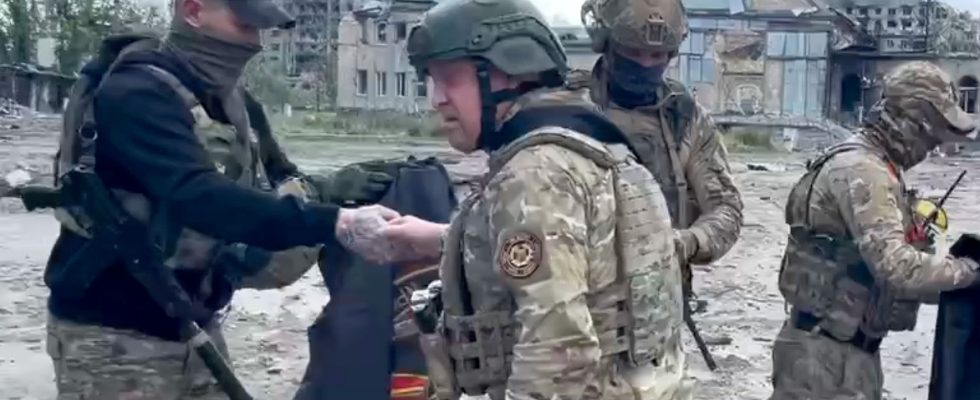On May 9, the National Assembly adopted a resolution calling on France and the European Union to include the Wagner mercenary group on the list of terrorist organizations. Objective: to acquire instruments to put a brake on the actions of this dangerous nebula, explains Renaissance MP Benjamin Haddad, who led this project. Interview.
L’Express: Why can we qualify this Russian militia as a terrorist organization?
Benjamin Haddad. This group deliberately targets civilians (assassinations, massacres, abuses, looting, intimidation) to obtain political gain, and participates in operations to destabilize public authorities (as in Libya or Sudan). All these actions correspond to the definition of terrorism adopted by the EU. Wagner is not a classic private military company motivated by the search for profit, he has a political project: to fight against democracies and support authoritarian regimes, particularly in Africa and the Middle East. These actions are part of the extension of the Kremlin’s policy of aggression on several continents. As on the Ukrainian front, in Bakhmout.
What other organization is this group like?
Comparisons have their limits, but one can think of the Hezbollah, whose armed wing is on the EU’s list of terrorist groups. It has its own organization while being an instrument of Iranian foreign policy. All things considered, the way in which Iran uses this militia to destabilize its neighbors – starting with Syria and Lebanon –, threaten Israel and have a lever of influence is quite comparable to what Moscow is doing with Wagner.
Can qualifying Wagner as a terrorist organization change the situation?
This non-binding resolution sends above all a political message. But the Assembly also seeks to create a European dynamic. What we are specifically asking for is the inclusion of Wagner on the EU’s list of terrorist groups. Currently, its sanction mechanisms are very complex in legal terms. Thus, you must demonstrate that a personality is directly linked to a war crime or abuses to punish it. When you label a group as terrorists, you expose all of its members to legal action and asset freezes. Today, eleven Wagner members are on the EU sanctions list. However, the group has some 50,000 militiamen in Ukraine, and between 9,000 and 10,000 in other theaters. The idea is to deprive them of impunity, as well as the companies and banks that could work with this entity. We could also strengthen European cooperation in intelligence and police action.
Do you think the other Member States will follow France’s lead?
The Lithuanians did it before us, and in the Bundestag German parliamentarians are interested, as in Sweden, Poland or Latvia. As for the British, they have just announced that they put Wagner on their own terrorist list. Things are moving. For their part, the Americans have decided to qualify Wagner as a transnational criminal organization, which gives them considerable extraterritorial tools to track her down everywhere and impose the force of their law on those who help her. But some voices across the Atlantic, such as the Senate Foreign Affairs Committee, also propose designating Wagner as a terrorist organization. France will have been at the forefront of this fight.
Could a European initiative slow down Wagner’s progress?
Equipping ourselves with tools that make it possible to freeze the funds of all Wagner members, from the senior official to the combatant, and to sanction its partners would create an aura of sulfur around this group. It’s not a magic bullet, but it’s the right direction. Let us give ourselves the means to defend our values and our interests. This is part of the material and mental rearmament of Europeans that President Macron has called for. Afterwards, we must also respond on the ground. France was directly targeted by Wagner. This company has amplified anti-French propaganda and disinformation in the Sahel and Mali, with, in particular, the infamous episode of the fake Gossi mass graves… Adapting to this hybridity is a major priority of the military programming law carried by Sébastien Lecornu : we are strengthening all our cyber, influence and intelligence resources. The way we refuted Gossi [NDLR : en diffusant des images montrant des mercenaires russes présumés en train de créer cette mise en scène] was innovative and helpful. It is up to us to offer an alternative to the countries concerned and encourage them to be our partners again. We have to become competitive again in this region of the world, and not leave it to the Russians and the Chinese. Wagner is an instrument of the Hybrid War Russia is waging against our democracies. In a way, we return to the mercenaries of the Middle Ages. Modernity was based on the idea that States had the legitimate monopoly of force. And here, on the contrary, we arrive at a form of postmodern privatization of extremely dangerous violence, which must be stopped.
“When we have to face these militias elsewhere [qu’en Ukraine] (…), it will be a formidable opponent”, estimated Pierre Schill, Chief of Staff of the Army… Could this scenario happen?
Wagner serves the worldview and interests of Russian foreign policy. But the proclaimed independence of the group has also been exploited by some of our partners to fight it. In Syria, at Der Eizzor in 2018, the Americans had struck Wagner’s positions. At the time, the Russians had not reacted.
